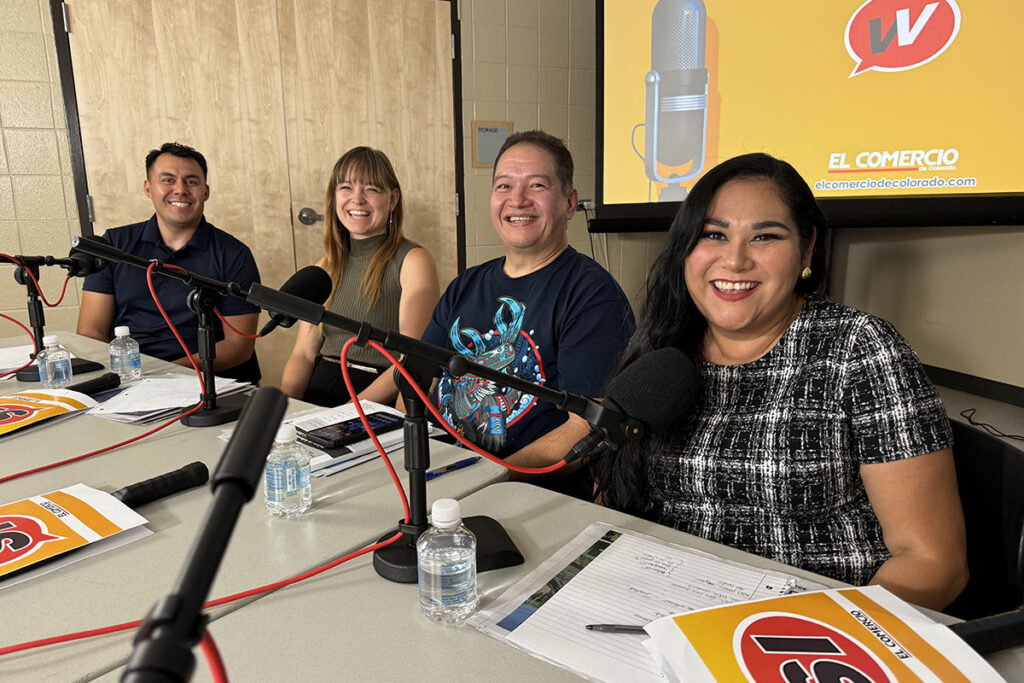
VOTERS IN DISTRICT 8 | Armando Ontiveros, Raquel Lane-Arellano, Omar Villanueva, and Ivette Díaz. (Photo/El Comercio de Colorado)
HISPANIC VOTERS DEBATE IN COLORADO’S DISTRICT 8
Newsroom El Comercio de Colorado
Haga click aquí para leer la versión en español
Colorado’s District 8, home to the largest proportion of Hispanics in the state, has become a focal point of discussions about important immigration and social policies. With 40% of its population of Hispanic origin and the highest level of enthusiasm to vote in the 2024 elections, according to the Latino Policy Agenda 2024, the district reflects the diverse views and concerns running through this community.
In a conversation organized by El Comercio de Colorado, four Hispanic voters discussed topics such as migration, reproductive rights, and inflation, revealing divergent views on asylum restriction and voting rights. The restriction on the use of political asylum, a hot topic in the national immigration debate, sparked disagreement among the participants. Three of the panelists opposed restricting asylum, while one supported the idea.
Opposing view
Omar Villanueva, an educator, acknowledged the importance of asylum but argued that this legal mechanism has been abused and should be applied more strictly. “It’s important to support asylum, but it needs to be more specific and clearer so that it’s not abused,” he commented. However, Omar opposed mass deportations, stating that such measures would devastate families.
“It would practically destroy families because in many cases, it’s the parents who are the economic breadwinners,” Omar said. On the other hand, Ivette Díaz, an executive at a non-profit organization, defended asylum as a fundamental right, asserting that the U.S. should remain a refuge for those facing persecution. “The United States should continue to be a beacon for those suffering under oppressive regimes,” she emphasized.

Distrito Congresional 8 de Colorado
Immigration reform
Ivette called for a comprehensive immigration reform to make the system fairer and more effective, better differentiating between those seeking legitimate opportunities and those with potential criminal intentions. Raquel Lane-Arellano stressed that asylum rights are an international commitment, recalling their roots in protecting people fleeing dangerous regimes, as happened during the Holocaust.
“It’s a right that should not be limited because many people’s lives are at stake,” emphasized the communicator. Armando Ontiveros, an entrepreneur whose father was deported over a decade ago, also expressed skepticism about restricting asylum and reiterated his opposition to mass deportations. “My father’s deportation caused my parents to divorce. He spent 15 years in Mexico,” Armando revealed.
The entrepreneur continued, “Unfortunately, now candidates are talking about mass deportations for a problem we’ve been dealing with for over 20 years. A concise reform, with clear objectives, that could open a path for people who have been here since 2000 to have better access to benefits such as legal status and the ability to work from five years ago onward.”
Inflation and reproductive rights
Regarding inflation, all participants agreed it has deeply affected their lives. Ivette, who is single and has a career, expressed frustration over the rising cost of living. “It’s offensive every time I go to the supermarket and see how much prices have gone up,” she stated. Both Omar and Raquel pointed out that large corporations have taken advantage of the pandemic to raise prices.
Reproductive rights were also divisive. While Ivette and Armando supported creating a federal law to restrict access to abortion, Raquel and Omar advocated for restoring the protections of Roe v. Wade. All four panelists plan to vote, reflecting the enthusiasm shown by District 8 voters. Seventy-two percent of Hispanics in that district said they would vote, according to the Latino Policy Agenda 2024.
You may also like:
East Colfax Community Collective could rescue apartments slated for closure in Aurora
Honduras inaugurates consulate in Aurora, Colorado
Yadira Caraveo: “Political asylum must be protected responsibly”





otras noticias
16th Street fills with free events and community activities
Guest Columnist – We must stand united against hate in all its forms
FBI Investigates Boulder Tragedy as Terrorist and Antisemitic Attack